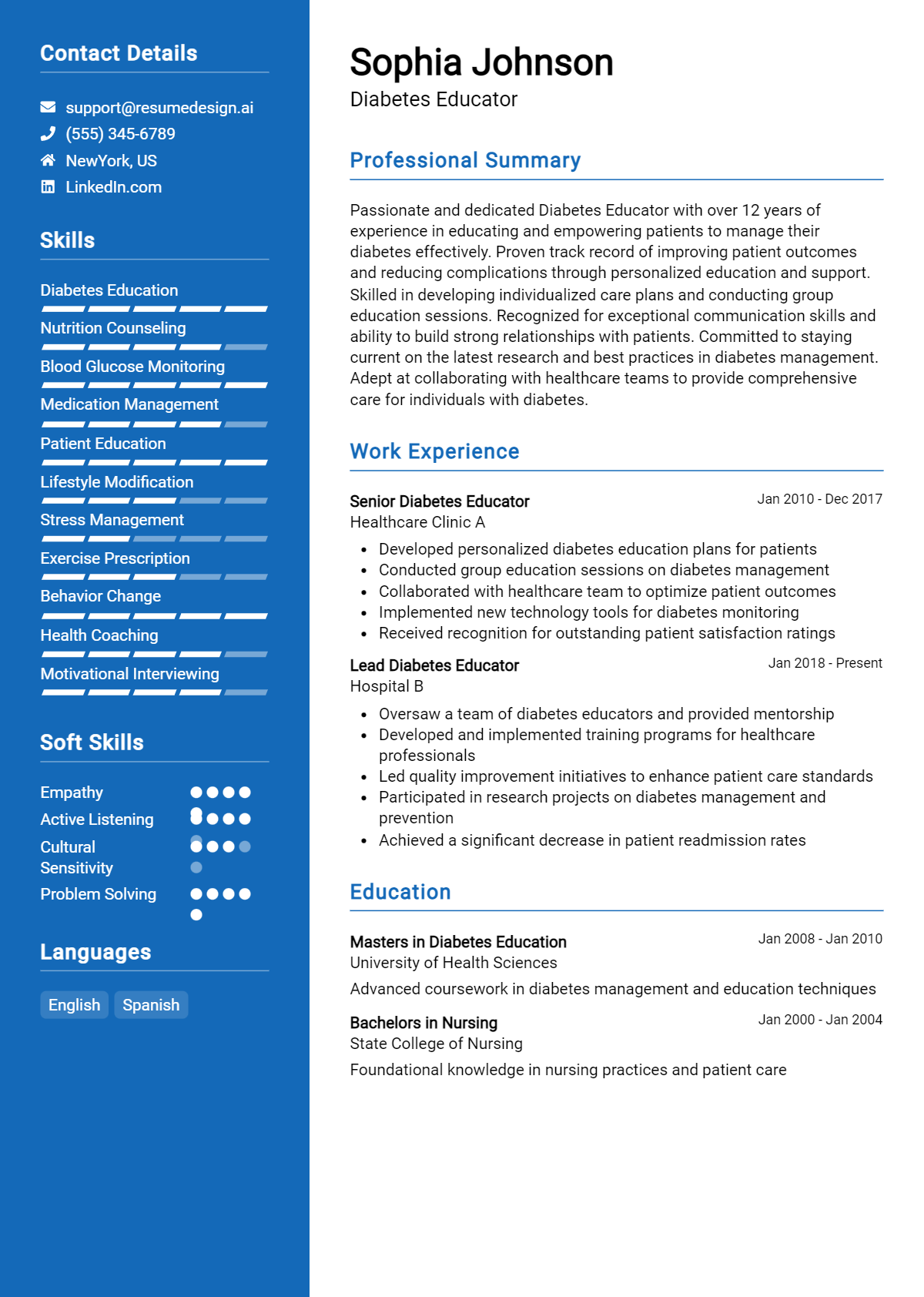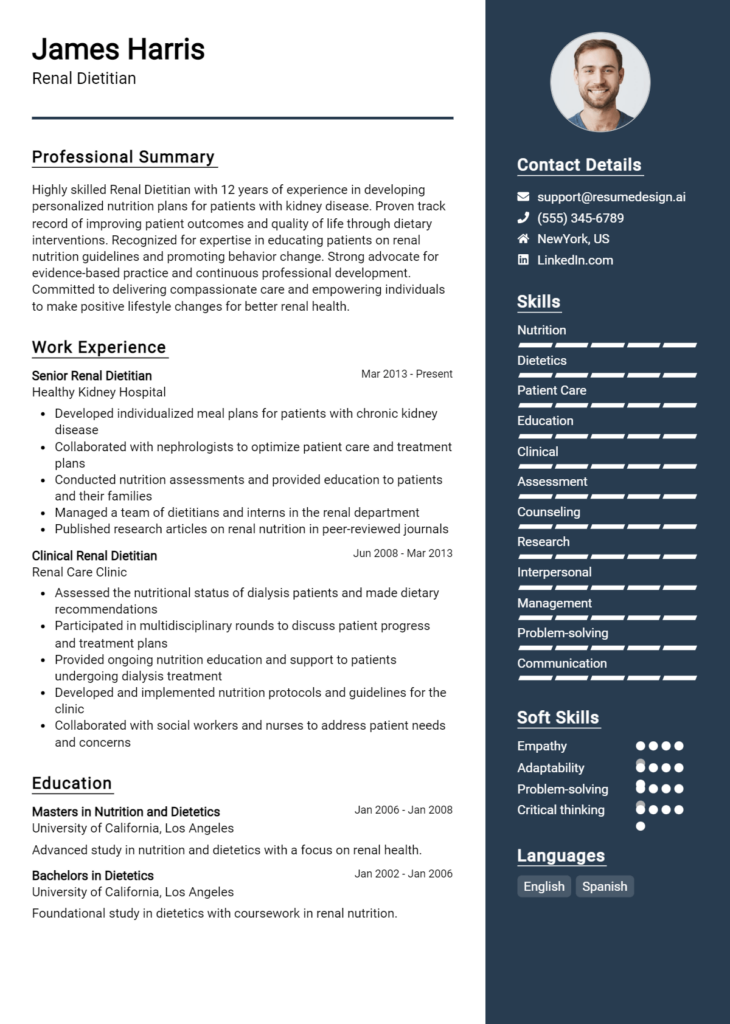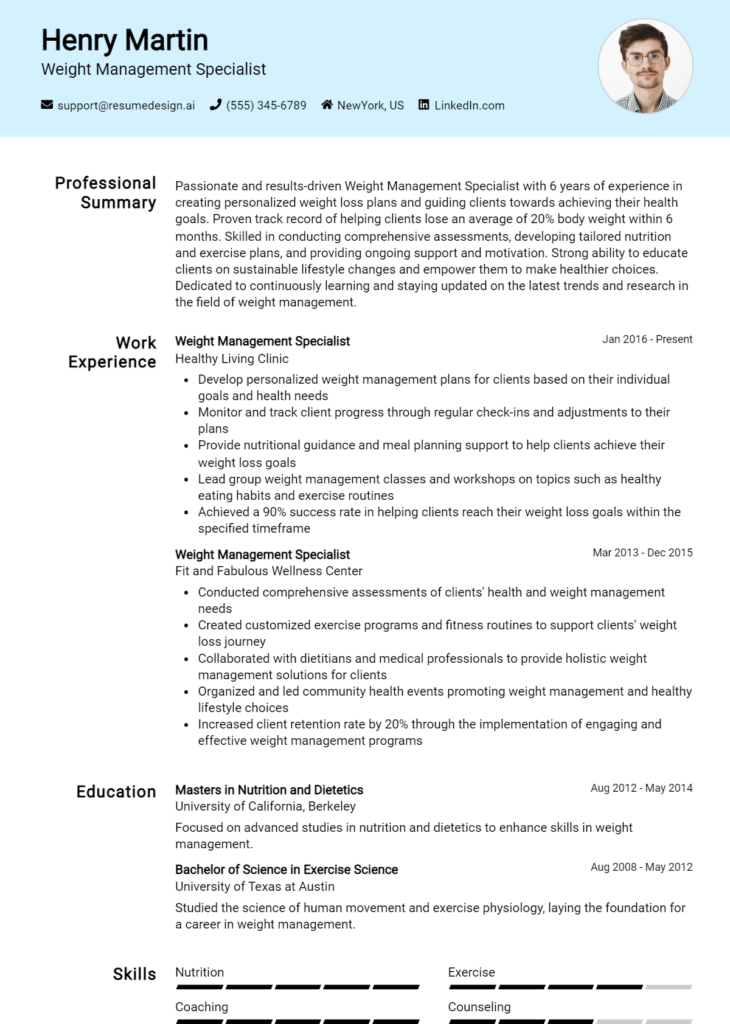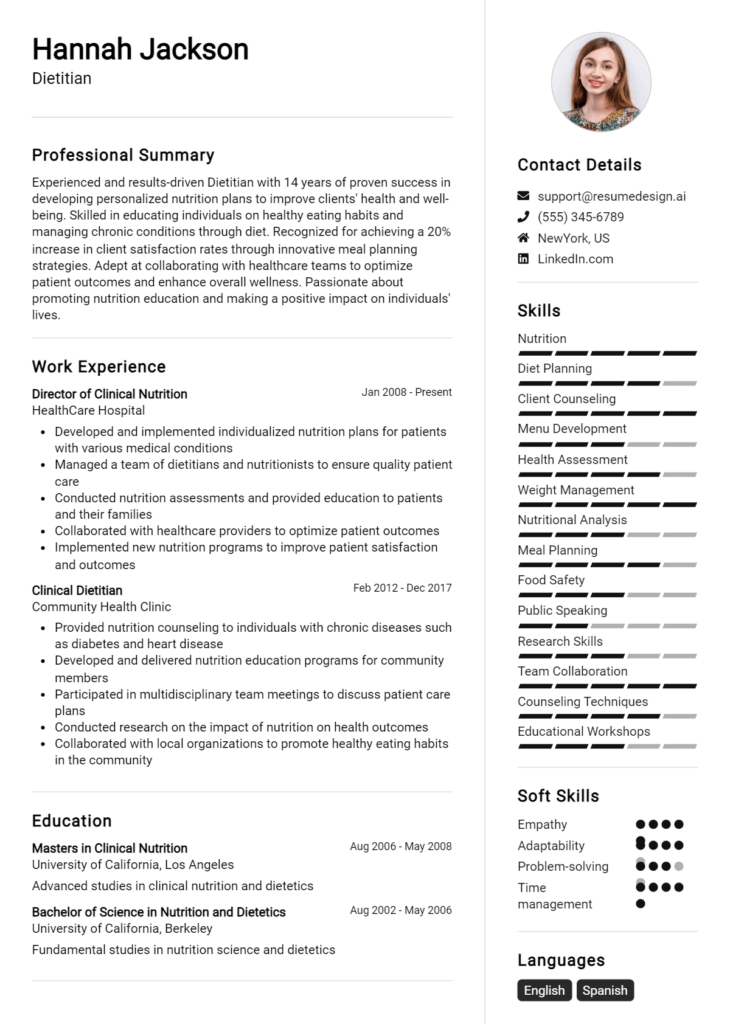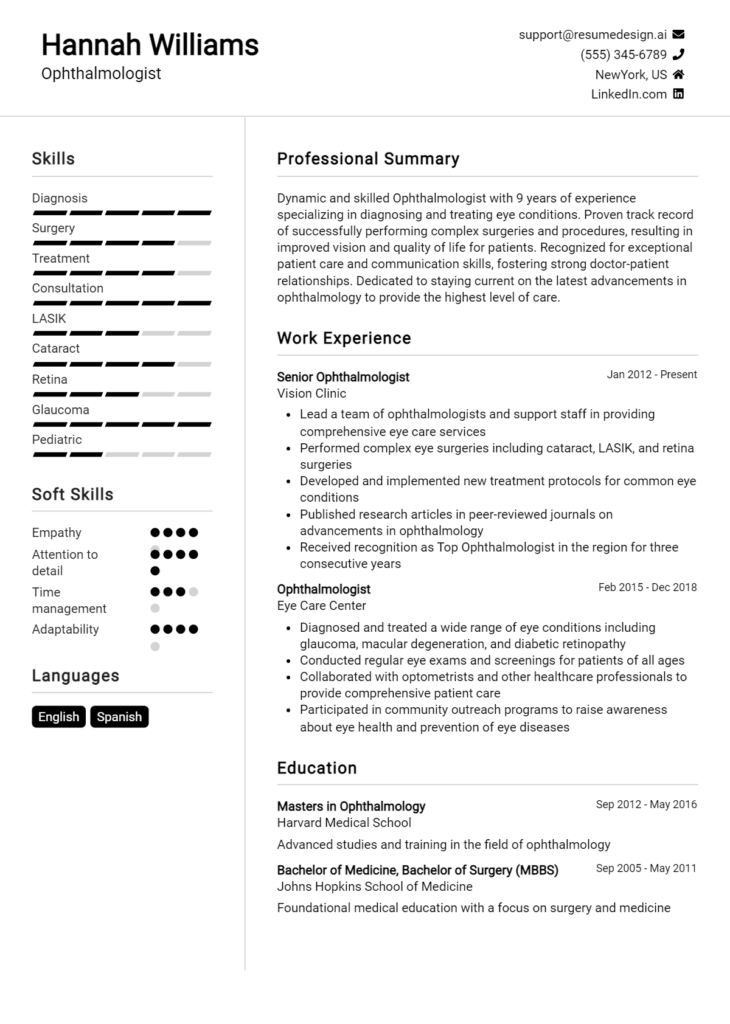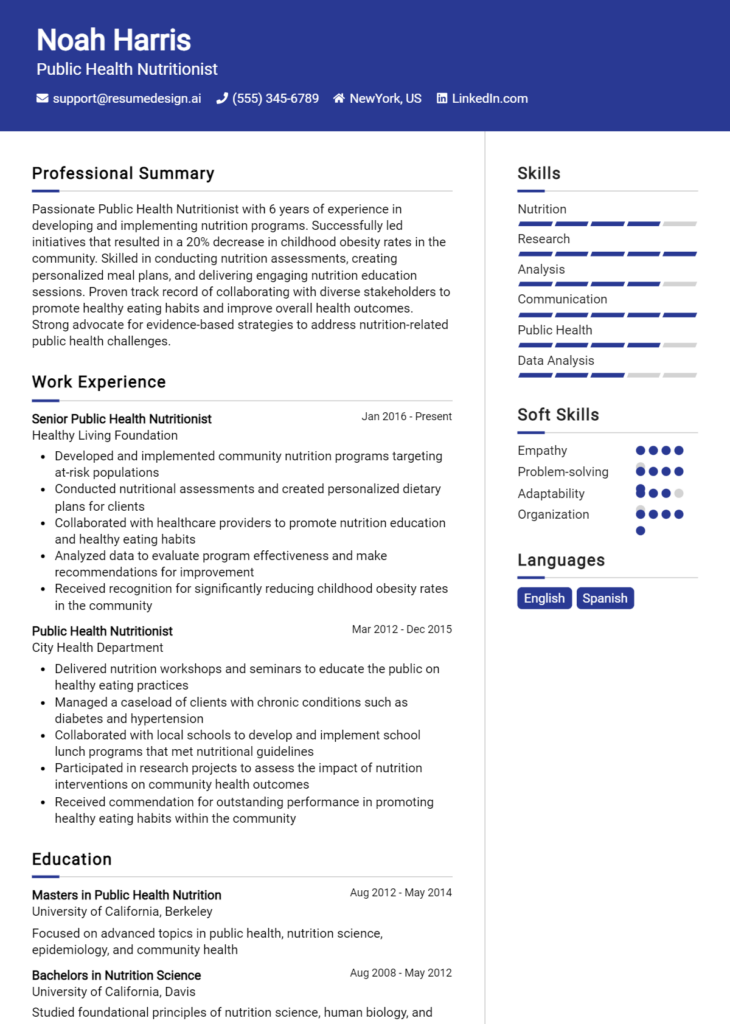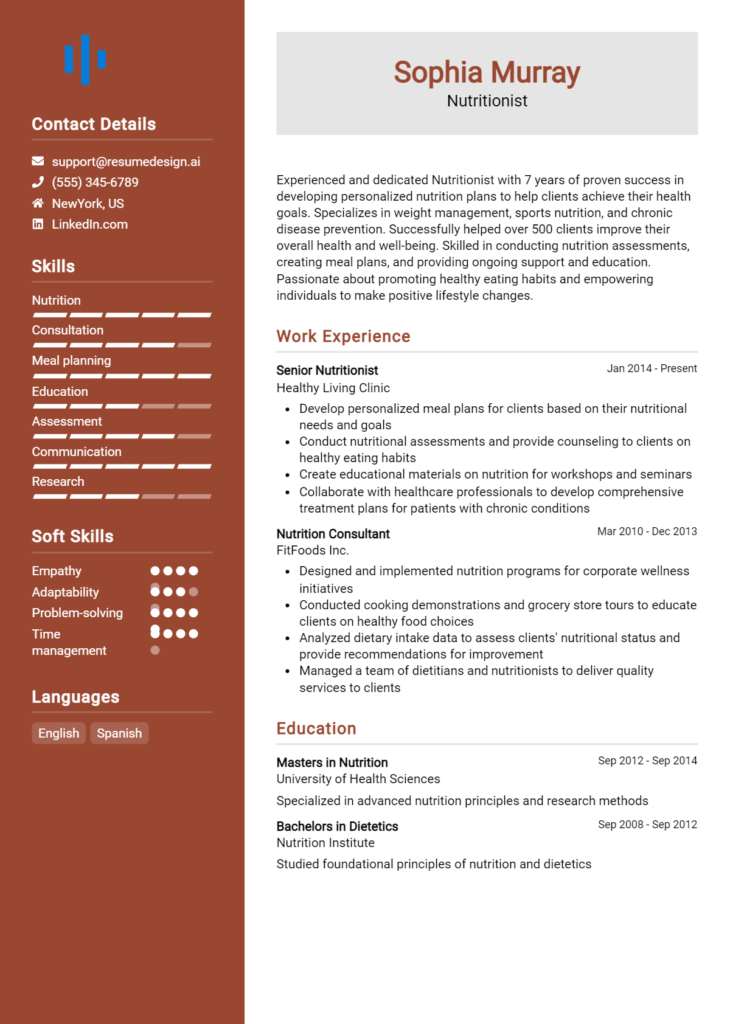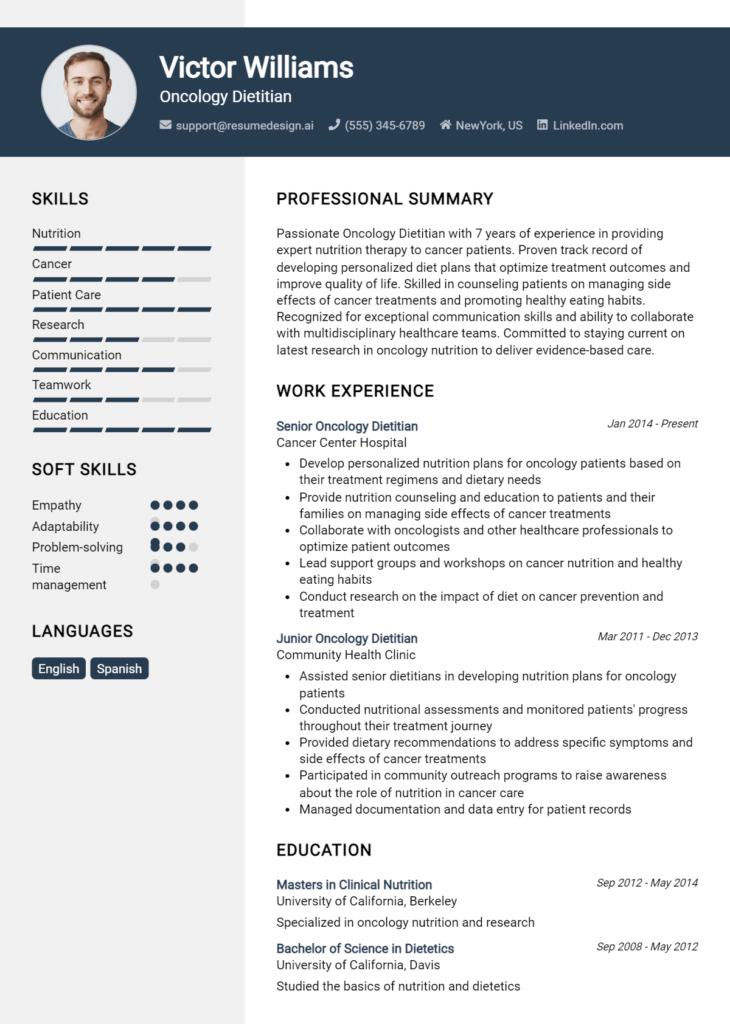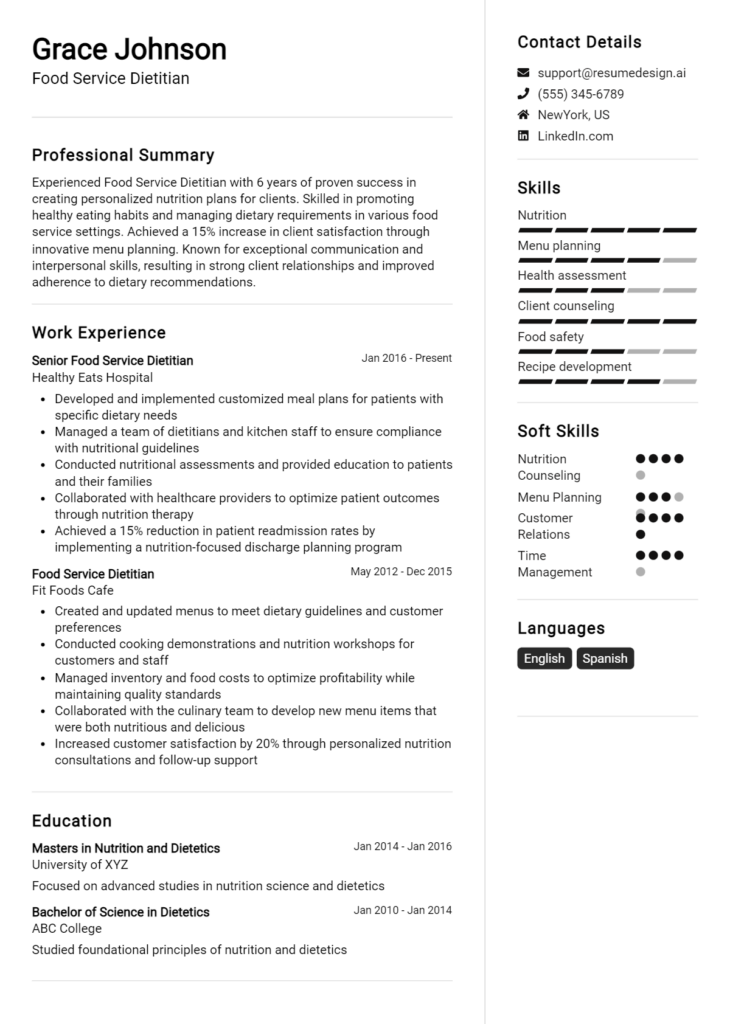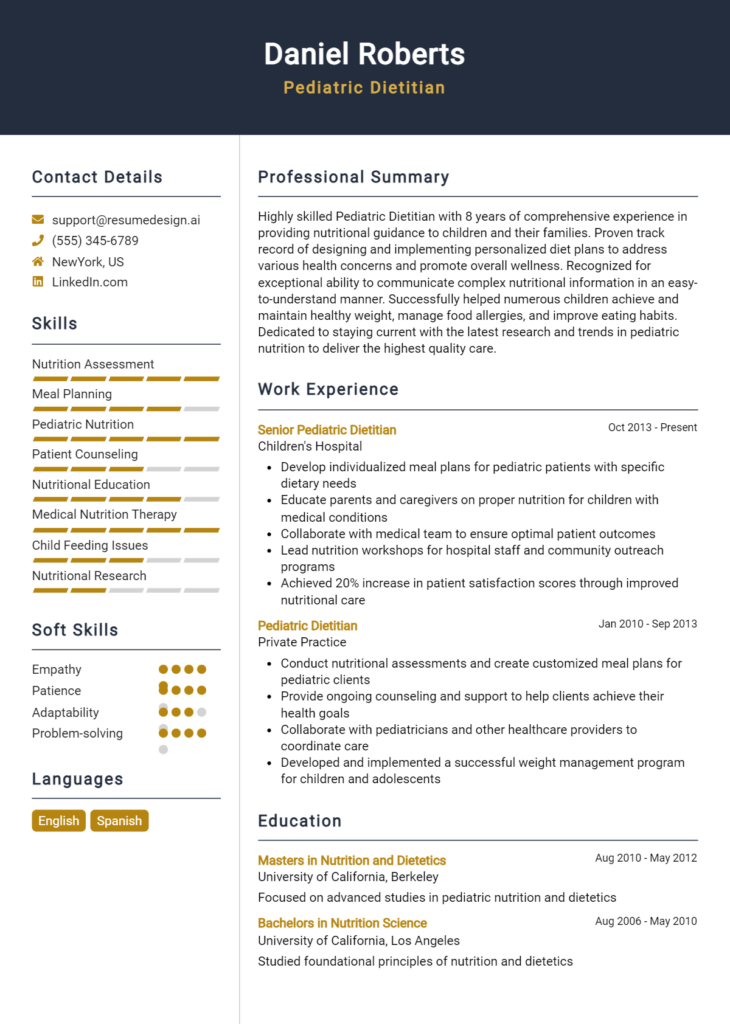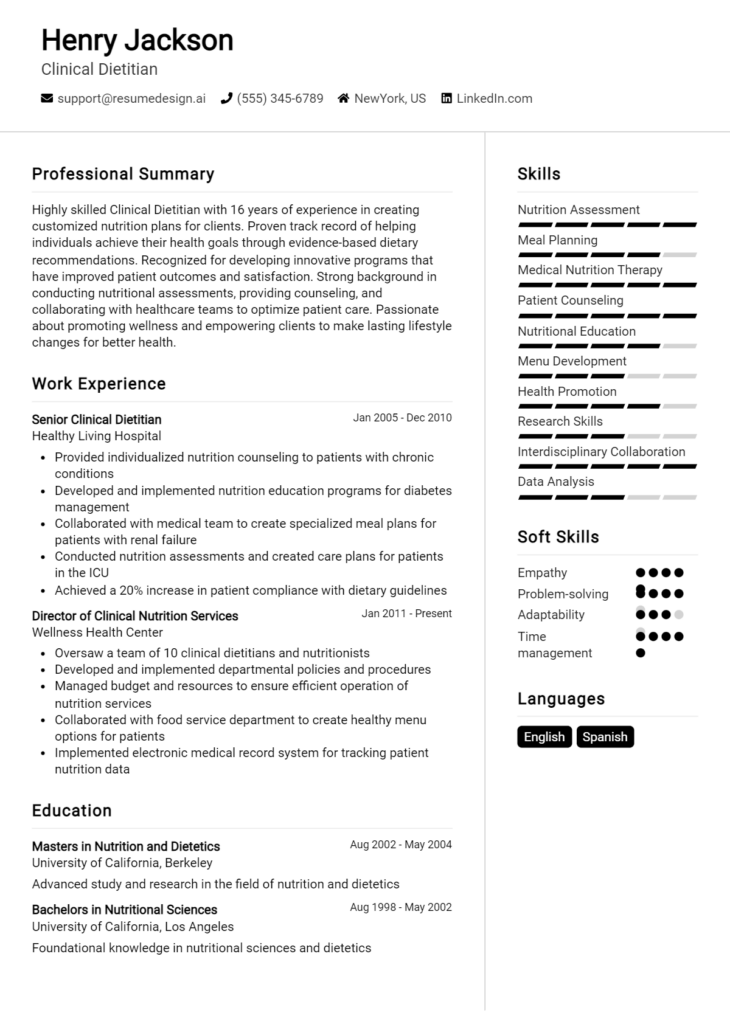Diabetes Educator Core Responsibilities
A Diabetes Educator plays a crucial role in bridging healthcare providers, patients, and community resources. Key responsibilities include assessing patients' needs, developing tailored education plans, and providing ongoing support to manage diabetes effectively. Essential skills encompass technical knowledge of diabetes management, operational efficiency in program delivery, and advanced problem-solving abilities to address patient challenges. These competencies not only enhance patient outcomes but also align with organizational goals, making a well-structured resume vital for showcasing these qualifications.
Common Responsibilities Listed on Diabetes Educator Resume
- Conducting individual and group education sessions on diabetes management.
- Assessing patients' understanding of diabetes and their self-management skills.
- Developing personalized diabetes care plans and goals.
- Collaborating with healthcare teams to optimize patient care.
- Monitoring and evaluating patient progress and adjusting plans as needed.
- Providing resources and tools for effective disease management.
- Staying updated on diabetes research and treatment options.
- Facilitating support groups and community outreach programs.
- Documenting patient interactions and educational interventions.
- Training healthcare staff on diabetes education techniques.
- Utilizing technology and tools for patient education and tracking.
- Advocating for patient access to diabetes care resources.
High-Level Resume Tips for Diabetes Educator Professionals
In the competitive field of diabetes education, a well-crafted resume is crucial for making a strong first impression on potential employers. As a Diabetes Educator, your resume serves as a snapshot of your professional journey, showcasing your skills, achievements, and commitment to improving the lives of individuals managing diabetes. It is essential that your resume not only highlights your qualifications but also resonates with the specific needs of the employer. This guide will provide practical and actionable resume tips specifically tailored for Diabetes Educator professionals, helping you stand out in this vital healthcare sector.
Top Resume Tips for Diabetes Educator Professionals
- Tailor your resume to each job description by incorporating relevant keywords and phrases that reflect the responsibilities and qualifications outlined in the posting.
- Highlight your relevant experience in diabetes education, including any clinical settings, community outreach programs, or patient education initiatives you have been involved with.
- Quantify your achievements by providing specific metrics, such as the number of patients educated, improvement in patient outcomes, or successful workshops conducted.
- Showcase your certifications, such as the Certified Diabetes Educator (CDE) designation, and any additional training or workshops that enhance your qualifications.
- Emphasize your communication and interpersonal skills, as these are vital for effectively educating and motivating patients.
- Include any collaborative projects with healthcare teams, demonstrating your ability to work within a multidisciplinary approach to patient care.
- Highlight your knowledge of the latest diabetes management technologies and tools, showing that you stay current with advancements in the field.
- Incorporate a professional summary at the top of your resume that encapsulates your passion for diabetes education and your career goals.
- Utilize action verbs to describe your responsibilities and achievements, making your contributions clear and impactful.
- Keep your resume concise and focused, ensuring that it does not exceed two pages while still providing ample detail about your qualifications.
By implementing these tips, you can significantly enhance the effectiveness of your resume and increase your chances of landing a job in the Diabetes Educator field. A targeted and well-structured resume will not only capture the attention of hiring managers but also convey your dedication and expertise to potential employers, setting you on the path to a rewarding career in diabetes education.
Why Resume Headlines & Titles are Important for Diabetes Educator
In the competitive field of diabetes education, a well-crafted resume headline or title is essential for making a memorable first impression on hiring managers. A strong headline serves as a succinct summary of a candidate's key qualifications and expertise, helping to catch the attention of recruiters quickly. It should encapsulate the essence of the applicant's professional identity and align closely with the job description. By being concise, relevant, and directly related to the specific role of a Diabetes Educator, an impactful headline can set a candidate apart from the rest, highlighting their unique skills and experiences in the realm of diabetes management and patient education.
Best Practices for Crafting Resume Headlines for Diabetes Educator
- Keep it concise: Aim for a headline that is brief and to the point, ideally one sentence.
- Be role-specific: Use terminology that directly relates to the role of a Diabetes Educator.
- Highlight key skills: Incorporate your most relevant skills or experiences that align with the job description.
- Use impactful language: Choose strong action words and phrases that convey confidence and expertise.
- Tailor for each application: Customize your headline for each job application to reflect the specific requirements of the position.
- Showcase accomplishments: If possible, include a quantifiable achievement to demonstrate your impact in previous roles.
- Maintain professionalism: Ensure that the tone is formal and suitable for the healthcare industry.
- Avoid jargon: While being specific is important, avoid overly technical terminology that may not be universally understood.
Example Resume Headlines for Diabetes Educator
Strong Resume Headlines
Dedicated Diabetes Educator with 5+ Years of Experience in Patient-Centered Care
Certified Diabetes Educator Specializing in Behavioral Modification and Patient Engagement
Proven Track Record of Reducing A1C Levels through Personalized Education Programs
Weak Resume Headlines
Healthcare Professional Looking for a Job
Experienced Worker in the Medical Field
Strong resume headlines are effective because they clearly communicate the candidate's qualifications and specific expertise relevant to the role of a Diabetes Educator. They offer a snapshot of the applicant's professional identity and accomplishments, making a compelling case for their candidacy. In contrast, weak headlines fail to impress as they lack specificity and do not adequately highlight the candidate's unique strengths or suitability for the position. Generic titles can blend into a sea of applications, diminishing the applicant's chances of standing out in a competitive job market.
Writing an Exceptional Diabetes Educator Resume Summary
A well-crafted resume summary is essential for a Diabetes Educator as it serves as the first impression to hiring managers. This brief yet powerful introduction highlights key skills, relevant experience, and notable accomplishments that align with the specific requirements of the job. A strong summary not only captures attention quickly but also sets the tone for the rest of the resume, making it crucial for candidates to present their qualifications concisely and impactfully. Tailoring this section to the job description can significantly enhance the chances of making a lasting impression and securing an interview.
Best Practices for Writing a Diabetes Educator Resume Summary
- Quantify Achievements: Use numbers and statistics to highlight your impact, such as the number of patients educated or improvements in patient outcomes.
- Focus on Relevant Skills: Highlight specific skills that are pertinent to diabetes education, such as communication, empathy, and curriculum development.
- Tailor to the Job Description: Customize your summary for each position you apply for, ensuring that it reflects the specific needs of that employer.
- Be Concise: Keep your summary to 2-4 sentences to maintain clarity and focus.
- Use Action Verbs: Start with dynamic action verbs to convey confidence and proactivity.
- Highlight Certifications: Mention relevant certifications or qualifications that set you apart from other candidates.
- Showcase Interpersonal Skills: Emphasize your ability to connect with patients and facilitate effective learning experiences.
- Include Professional Experience: Briefly mention years of experience in diabetes education or related fields to establish credibility.
Example Diabetes Educator Resume Summaries
Strong Resume Summaries
Compassionate Diabetes Educator with over 5 years of experience in developing personalized education plans for diverse patient populations. Successfully improved patient adherence to diabetes management protocols by 30% within 6 months, utilizing innovative teaching methods and ongoing support.
Dedicated Diabetes Educator with a proven track record of training over 200 patients in effective self-management techniques, resulting in a 40% reduction in hospital admissions. Expertise in utilizing data-driven approaches to tailor educational programs and enhance patient engagement.
Results-oriented Diabetes Educator with 7 years in clinical settings, adept at creating dynamic workshops that increased patient knowledge by 50%. Certified Diabetes Educator (CDE) with strong communication skills, committed to fostering lasting relationships with patients to improve health outcomes.
Weak Resume Summaries
Experienced healthcare professional looking for a position as a diabetes educator. I have worked with patients and have some knowledge of diabetes.
A diabetes educator with a passion for helping others. I have taught classes and am interested in finding a new opportunity in diabetes education.
The strong resume summaries are effective because they provide specific details about the candidate's achievements and skills, demonstrating a clear impact on patient care. They use quantifiable outcomes to highlight success and are tailored to showcase relevant experience. In contrast, the weak summaries are vague and lack concrete results, making it difficult for hiring managers to gauge the candidate's effectiveness and fit for the role. They fail to convey the unique value the candidates can bring to an employer.
Work Experience Section for Diabetes Educator Resume
The work experience section of a Diabetes Educator resume is crucial as it serves as a reflection of the candidate's practical skills and their impact within the healthcare field. This section not only highlights the technical expertise required to educate patients about managing diabetes but also demonstrates the candidate's ability to lead teams and deliver high-quality educational programs. By quantifying achievements and aligning experiences with industry standards, candidates can effectively showcase their value to potential employers, illustrating how their contributions have led to improved patient outcomes and organizational success.
Best Practices for Diabetes Educator Work Experience
- Highlight relevant certifications and specialized training in diabetes management.
- Quantify outcomes, such as percentage improvements in patient knowledge or engagement levels.
- Emphasize collaboration with healthcare teams and community resources to enhance patient education.
- Detail specific programs or initiatives developed and their impact on patient care.
- Include leadership roles in workshops, seminars, or educational events.
- Use action verbs to describe responsibilities and achievements, enhancing impact.
- Showcase experience with technology and tools used in diabetes education.
- Align descriptions with current industry standards and best practices in diabetes care.
Example Work Experiences for Diabetes Educator
Strong Experiences
- Developed and implemented a diabetes self-management education program that improved patient compliance by 30% over six months.
- Led a multidisciplinary team in creating a diabetes care initiative that resulted in a 25% reduction in hospital readmissions for diabetic patients.
- Conducted over 50 community workshops on diabetes prevention, increasing attendance by 40% through targeted outreach and marketing strategies.
- Collaborated with local health organizations to establish a diabetes support group, enhancing patient engagement and satisfaction scores by 20%.
Weak Experiences
- Worked with patients on diabetes education.
- Assisted in various health-related programs.
- Helped improve patient outcomes.
- Participated in team meetings regarding diabetes care.
The examples provided illustrate the distinction between strong and weak experiences in a Diabetes Educator's resume. Strong experiences are characterized by specific achievements and quantifiable results, demonstrating the candidate's effectiveness and leadership in diabetes education. In contrast, weak experiences lack detail and measurable outcomes, making it difficult for potential employers to assess the candidate's true impact and capabilities. Highlighting concrete accomplishments is essential for creating a compelling narrative that showcases a Diabetes Educator's qualifications.
Education and Certifications Section for Diabetes Educator Resume
The education and certifications section of a Diabetes Educator resume is crucial in establishing the candidate's qualifications and expertise in managing diabetes care. This section serves to highlight the individual’s academic background, including relevant degrees, as well as industry-recognized certifications that demonstrate their commitment to ongoing professional development. By detailing relevant coursework, specialized training, and certifications, candidates can significantly enhance their credibility and show alignment with the specific requirements of the job role. Employers seek these qualifications to ensure that their Diabetes Educators possess the necessary knowledge and skills to provide effective patient education and support.
Best Practices for Diabetes Educator Education and Certifications
- Focus on degrees and certifications that are directly related to diabetes education, such as a Bachelor's or Master's in Nursing, Nutrition, or Public Health.
- Highlight any advanced certifications, such as Certified Diabetes Educator (CDE) or Board Certified-Advanced Diabetes Management (BC-ADM), to showcase specialized expertise.
- Include relevant coursework or training programs that pertain to diabetes management, education strategies, and patient support.
- Ensure that all certifications are current and provide renewal dates to reflect ongoing professional development.
- List any professional memberships in diabetes-related organizations, such as the American Association of Diabetes Educators (AADE).
- Be specific about the level of detail in your education section, including the institution's name, degree earned, and graduation year.
- Use clear and concise language to make it easy for hiring managers to quickly assess qualifications.
- Tailor the education and certifications section to align with the specific job description and requirements of the position being applied for.
Example Education and Certifications for Diabetes Educator
Strong Examples
- Bachelor of Science in Nursing (BSN), University of Health Sciences, 2020
- Certified Diabetes Educator (CDE), National Certification Board for Diabetes Educators, 2023
- Master of Public Health (MPH) with a focus on Chronic Disease Management, State University, 2022
- Diabetes Educator Training Program, American Association of Diabetes Educators, 2021
Weak Examples
- Bachelor of Arts in English Literature, 2010
- Basic First Aid Certification, 2015
- Online Course in Social Media Marketing, 2022
- Certification in Yoga Instruction, 2018
The examples listed above are considered strong because they directly relate to the field of diabetes education, showcasing relevant degrees and certifications that align with the role's requirements. They emphasize specialized knowledge and commitment to professional growth. In contrast, the weak examples reflect qualifications that are either outdated, irrelevant to diabetes education, or unrelated to the skills needed for effective patient management and education, which could detract from a candidate's suitability for the position.
Top Skills & Keywords for Diabetes Educator Resume
As a Diabetes Educator, possessing the right skills is crucial for effectively supporting patients in managing their diabetes. A well-crafted resume that highlights both hard and soft skills can significantly enhance a candidate's appeal to potential employers. These skills not only demonstrate the candidate's technical knowledge and expertise in diabetes management but also their ability to connect with patients, fostering trust and understanding. By showcasing a balanced mix of interpersonal abilities and clinical competencies, a Diabetes Educator can illustrate their capacity to improve patient outcomes and contribute positively to healthcare teams.
Top Hard & Soft Skills for Diabetes Educator
Soft Skills
- Empathy
- Communication
- Active Listening
- Problem-Solving
- Patience
- Motivational Skills
- Cultural Competence
- Adaptability
- Team Collaboration
- Conflict Resolution
- Time Management
- Instructional Skills
- Emotional Intelligence
Hard Skills
- Knowledge of Diabetes Management Protocols
- Patient Assessment Techniques
- Nutritional Counseling
- Blood Glucose Monitoring
- Insulin Administration
- Diabetes Education Program Development
- Data Analysis and Interpretation
- Familiarity with Electronic Health Records (EHR)
- Health Coaching
- Clinical Research Skills
- Pharmacy Knowledge
- Understanding of Health Insurance Processes
- CPR and Basic Life Support Certification
- Familiarity with Medical Equipment (e.g., glucometers)
- Public Speaking and Presentation Skills
For more insights on how to effectively present your skills and work experience in your resume, consider exploring additional resources that can help you stand out in the competitive field of diabetes education.
Stand Out with a Winning Diabetes Educator Cover Letter
Dear Hiring Manager,
I am writing to express my interest in the Diabetes Educator position at [Organization Name], as advertised on [where you found the job listing]. With a background in nursing and a specialization in diabetes management, I am passionate about empowering patients to take control of their health through education and support. My hands-on experience in clinical settings, combined with my commitment to continuous learning, equips me to make a significant contribution to your team and the patients we serve.
In my previous role at [Previous Organization Name], I developed and implemented individualized diabetes education programs that addressed the unique needs of diverse patient populations. By utilizing a variety of teaching methods, including one-on-one counseling, group sessions, and digital resources, I successfully improved patient understanding of diabetes management strategies, leading to increased adherence to treatment plans and better health outcomes. My ability to build strong relationships with patients and their families has been instrumental in promoting lifestyle changes that support long-term diabetes care.
I am particularly drawn to [Organization Name] because of its commitment to innovative patient-centered care and community outreach. I admire your efforts to enhance diabetes education resources and support systems for underserved populations. I am eager to collaborate with your multidisciplinary team to develop comprehensive educational materials and workshops that inform and inspire patients, ultimately improving their quality of life. My strong communication skills and empathetic approach will enable me to connect with individuals on a personal level, fostering an environment where they feel comfortable discussing their challenges and successes.
Thank you for considering my application. I am excited about the opportunity to bring my expertise in diabetes education to [Organization Name] and contribute to your mission of improving health outcomes for individuals living with diabetes. I look forward to the possibility of discussing how my background, skills, and enthusiasm align with the goals of your team.
Sincerely,
[Your Name]
[Your Contact Information]
Common Mistakes to Avoid in a Diabetes Educator Resume
Creating a resume as a Diabetes Educator requires a careful balance of showcasing your clinical expertise, educational background, and interpersonal skills. However, many applicants fall into common pitfalls that can undermine their chances of landing an interview. Avoiding these mistakes will help you present a polished and professional resume that highlights your qualifications and passion for diabetes education. Here are some of the most frequent errors to watch out for:
Lack of Specificity: Failing to include specific details about your experience, such as the number of patients you have worked with or particular programs you have developed, can make your resume less impactful.
Overloading with Jargon: While it’s important to demonstrate your knowledge, using excessive medical jargon can alienate hiring managers. Aim for clear, accessible language that conveys your expertise without overwhelming the reader.
Ignoring Keywords: Not tailoring your resume to include keywords from the job description can result in your application being overlooked by applicant tracking systems (ATS) that many employers use.
Poor Formatting: A cluttered or inconsistent format can distract from your qualifications. Use clear headings and bullet points to make your resume easy to read and visually appealing.
Neglecting Continuing Education: Omitting any relevant certifications, workshops, or ongoing education can make it seem like you are not keeping up with the latest advancements in diabetes care.
Generic Objective Statements: Using a one-size-fits-all objective statement can come off as impersonal. Tailor your objective to reflect your specific interest in the position and how your skills align with the organization’s goals.
Inadequate Soft Skills Emphasis: While clinical skills are crucial, neglecting to mention your communication and interpersonal skills can be a missed opportunity. Diabetes education is as much about building relationships as it is about providing information.
Listing Responsibilities Instead of Achievements: Focusing on job duties rather than quantifiable achievements may diminish your impact. Highlight outcomes and successes in your previous roles to demonstrate your effectiveness.
Conclusion
As a Diabetes Educator, your role is crucial in helping individuals manage their condition effectively. Throughout this article, we explored the essential skills and qualifications necessary for this position, including strong communication abilities, empathy, and a thorough understanding of diabetes management techniques. Additionally, we discussed the importance of staying updated on the latest research and treatment options to provide the best support for patients.
In conclusion, it’s vital to present your qualifications and experience in the best light possible. This starts with a well-crafted resume that highlights your strengths and expertise as a Diabetes Educator. We encourage you to take a moment to review your current resume and ensure it effectively reflects your skills and achievements.
To assist you in this process, a variety of tools are available. Check out our resume templates to find a design that suits your style. If you prefer a more customizable option, try our resume builder to create a personalized resume effortlessly. Additionally, you can explore resume examples for inspiration, and don't forget to pair your resume with a standout application by using our cover letter templates.
Take charge of your career by ensuring your resume is as impressive as your qualifications. Start today!

